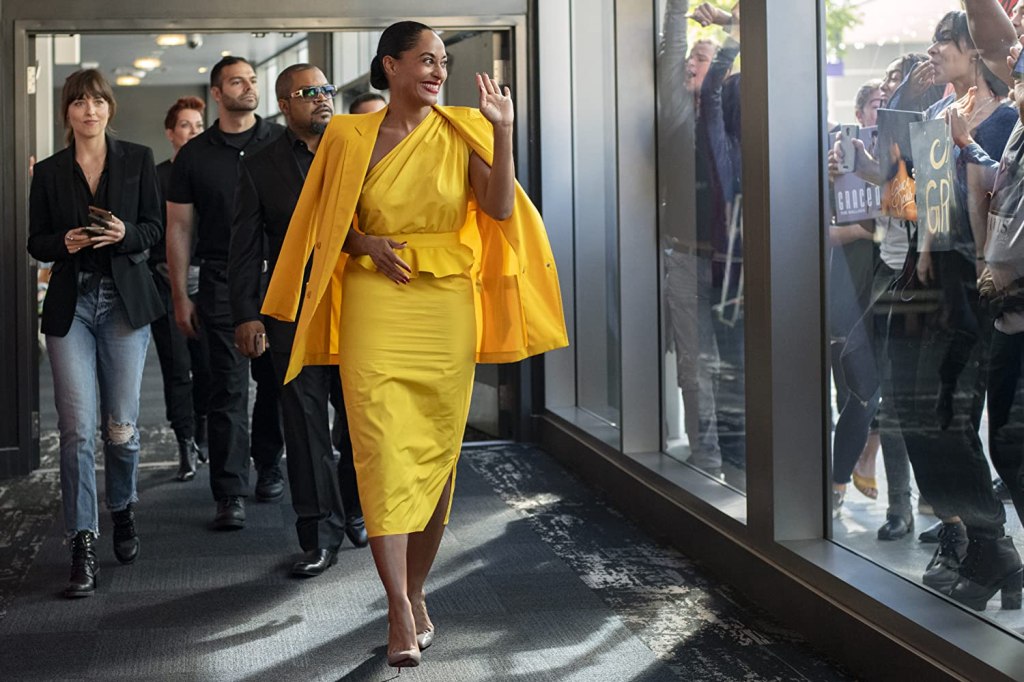Grace Davis (Tracee Ellis Ross) is a mega music star. She’s touring the world, selling out stadiums, and she’s not slowing down. But she’s not recording new music, either – not in a decade. She’s a middle-aged woman of colour, not exactly the stuff of 2020’s Billboard #1 artists, as her manager (Ice Cube) and label guys keep not-so-gently reminding her. The safe bet is to keep playing those same beloved songs to her ever-fervent fans, maybe do a nice, safe Vegas residency, and every so often repackage those hits into a “new” greatest hits album. Grace Davis is a fictional star but I’m sure these credentials are reminding you of more than one of yesterday’s top recording artists. Maybe even of Tracee Ellis Ross’s own mama, Ms. Diana Ross.

Grace’s personal assistant Maggie (Dakota Johnson) has been fetching her green juice and dry cleaning thanklessly for the past 3 years. Maggie keeps hoping her role will be a stepping stone to where she’d actually want to be – a producer – but not only is Grace not recording music, she’s adamant that Maggie stay in her lane. So when Maggie bumps into David (Kelvin Harrison, Jr) on an errand for Grace, she’s pretty open to following her dream in another direction. David’s playing the grocery store’s parking lot, but his talent is legit so she fudges the details and convinces him to let her produce his album.
Does the moonlighting go well? It would be a crummy movie if everyone just lived happily ever after forevermore. There’s going to be some major bumps. Ellis Ross is terrific as Grace, but she’s definitely not just channeling her mother. She’s made Grace the hardest of things: a pop icon, and an actual woman. She’s worried about staying relevant, about aging, about work-life balance, about being the only woman in a room full of men trying to determine her future. Meanwhile, Maggie is trying to break into a male-dominated field that tries to discourage her by having her fetch coffee. Thematically, this film is the perfect follow-up for director Nisha Ganatra, who gave us Late Night last year.
The Dakota Johnson arc is a little pat, a little too rom-commy; The High Note actually shines when Ross is on screen stealing scenes. I almost wish we could have just stayed with her and lived in her skin, a true testament to Ross and the layered character she crafts. Still, the ensemble is talented, and if at times the script veers toward formulaic, the film is glossy, the songs are catchy, and Ross is indeed a star.

 movie it sets itself up to be, but there’s something to be said for intimacy in adversity. And campfire spooning. And eating bear sushi. There’s no denying that this movie is every single mother’s worst nightmare, and I’m 100% certain that when David’s mom put him on a plane to Montana, this is exactly the worst case scenario she envisioned. This movie may inspire adjustments to custody arrangements like nobody’s business, but it’s quite beautifully filmed, and edited to wring masculine, jerky-scented tears from the macho men who watch it.
movie it sets itself up to be, but there’s something to be said for intimacy in adversity. And campfire spooning. And eating bear sushi. There’s no denying that this movie is every single mother’s worst nightmare, and I’m 100% certain that when David’s mom put him on a plane to Montana, this is exactly the worst case scenario she envisioned. This movie may inspire adjustments to custody arrangements like nobody’s business, but it’s quite beautifully filmed, and edited to wring masculine, jerky-scented tears from the macho men who watch it. The Ballad of Lefty Brown starts from an interesting place. Writer/director Jared Moshe was curious about the bumbling sidekick in John Wayne movies, the guy who functioned as comic relief. That archetypal character could not do anything right, so why did someone like John Wayne choose to have a bumbling guy like that as the one watching his back?
The Ballad of Lefty Brown starts from an interesting place. Writer/director Jared Moshe was curious about the bumbling sidekick in John Wayne movies, the guy who functioned as comic relief. That archetypal character could not do anything right, so why did someone like John Wayne choose to have a bumbling guy like that as the one watching his back?